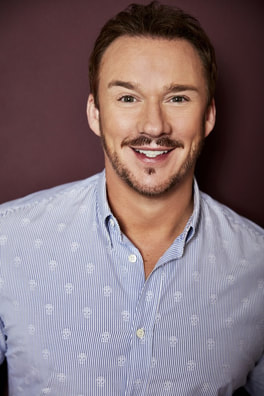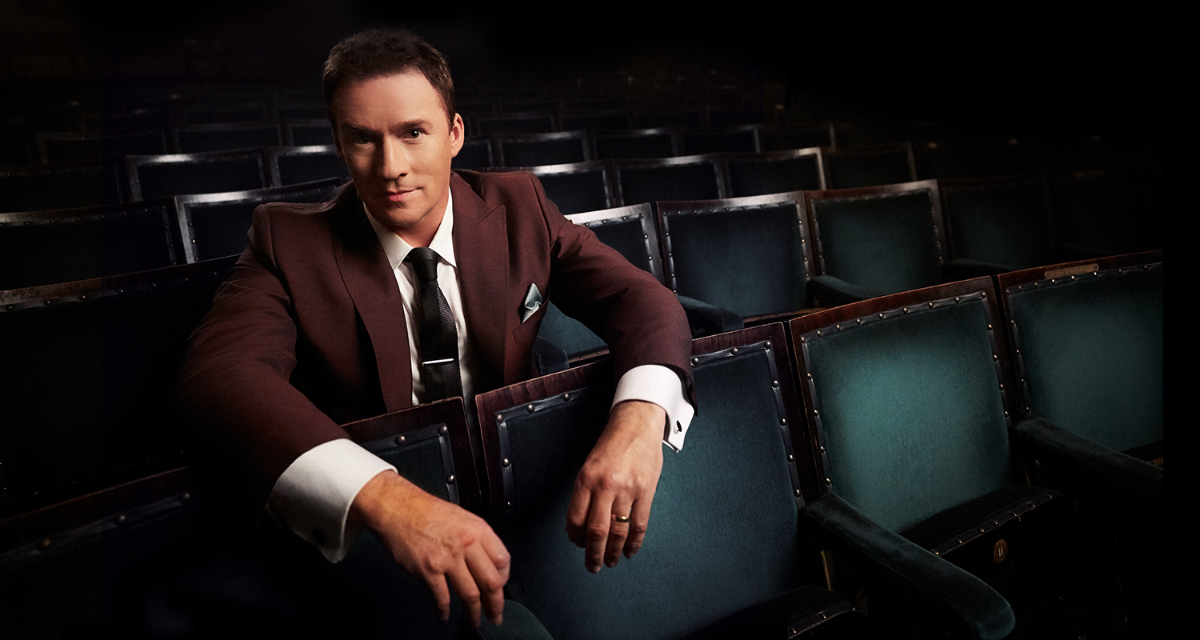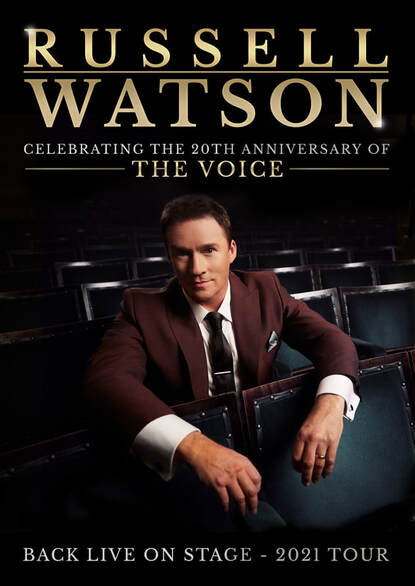RUSSELL WATSON INTERVIEW
CELEBRATING THE 20TH ANNIVERSARY OF
THE VOICE
CELEBRATING THE 20TH ANNIVERSARY OF
THE VOICE
Russell Watson left school at the age of sixteen with no qualifications and spent the first eight years of his working life in a factory making nuts and bolts. His desire to escape the monotony of the shop floor led him to enter a local radio talent competition where he beat four hundred other contestants.
Russell has overcome many things in his life maintaining a dignity few could rival when struck by not one but two brain tumours and bouncing back in better voice than before. Warmly referred to as the People’s Tenor, Russell’s journey took him from a Salford estate to the world’s most prestigious concert halls, and to becoming the best-selling male classical artist of all time.
With an upcoming tour celebrating the twentieth anniversary of his first CD release, The Voice, Russell Watson chats to Southend Theatre Scene’s Andrew Walters. He talks about some of his favourite memories and what audiences can look forward to at his Cliffs Pavilion Concert on Sunday 28th November.
Russell has overcome many things in his life maintaining a dignity few could rival when struck by not one but two brain tumours and bouncing back in better voice than before. Warmly referred to as the People’s Tenor, Russell’s journey took him from a Salford estate to the world’s most prestigious concert halls, and to becoming the best-selling male classical artist of all time.
With an upcoming tour celebrating the twentieth anniversary of his first CD release, The Voice, Russell Watson chats to Southend Theatre Scene’s Andrew Walters. He talks about some of his favourite memories and what audiences can look forward to at his Cliffs Pavilion Concert on Sunday 28th November.

Russell is clearly in a reflective mood as we begin our conversation via Zoom call. I ask him how he chose the songs for the tour.
“It's a collection of what I think are my fans' favourites over the last twenty years; and a collection of my favourites too; the songs I have really enjoyed performing over those twenty years of my recording career. It’s going to be a celebration of life and music, stories from during this time and how I've got to where I am.”
I show Russell my own copy of The Voice Sheet Music Book, which accompanied his very first solo CD release. I mention to him that there are so many different styles of music in this book alone and asked what draws him to a piece of music in the first place.
“If I'm singing a ballad I want to make an emotional connection with that ballad. I want to understand what the piece of music and the intent of the lyricist was at the time of writing. Second to that, with any piece, it is important for any artiste to put their own stamp on it. So, if I’m listening to a new piece of music, I generally try not to listen to too many other performances of it, because you tend to adopt someone else’s version of the song.”
“So, for example, with Stephen Sondheim’s Send In The Clowns; I wanted to put my own stamp on that particular piece with my Musical Director. Going through it, I was able to do pull ups that weren’t written, and back phrase where they weren’t written, because it is my very own particular performance of it. As a result it became my song on the night, and we got a fantastic response from the audience, because I felt a real connection with it, like a little piece of me was being channelled into that particular song.”
“That is what I think is the key to any performance, to make that connection. Obviously if you’re performing in a musical, you have to then stay true to the music and the text as it was written. Still bring a little of yourself, but you can’t make so many changes, otherwise it becomes problematic for the writers.”
“I know that from working with Claude-Michele Shonberg. I made an album with him. I could tell that if I made a subtle change, he, as the writer, didn’t like it. On one occasion, we were in the studio, recording a particular song, and he would interrupt saying, ‘One more time for me Russell.’ After this happened for the third or fourth time, I said ‘Please Claude-Michele, I am just trying to familiarise myself with the piece! Let me just sing the song? To which he replied, ‘Ah, but you have to familiarise yourself correctly.’”
Russell can follow a musical line, but does not read music conventionally. His route into the world of music was an unconventional one, in his own words, ‘cart before the horse.’ He explains,
“I’ve always had a musical ear. I have perfect pitch, but it was never utilised properly in the early stages. For example, my MD can say ‘Volaré’ and I'll start singing it. It will usually be at the right pitch, and the MD will say, ‘spot on’. There is a degree of muscle memory and pitch association, which I realised I had from a very early age. As a kid, I thought everybody knew the pitches of the next song on whatever album I was listening to. If I was listening to The Jam, before the next song came on, I’d be singing the next song at the right pitch.
I ask Russell if he enjoyed singing as a child, and what his ambitions were when he was growing up.
“To be honest, as a child, singing was more of a private thing. I wasn’t shy, far from it. I was quite boisterous and always the class joker doing impersonations of the teachers and my mates, but I was definitely shy about singing. I used to love listening to the Chart Countdown, and would sing along, emulating the singer I was listening to. So, if the song was by Cliff Richard, I would sing like Cliff Richard; or if The Jam came on, I would sing how Paul Weller sang, and it was only later I realised that not everyone could do this.”
Russell loves to connect with his audience and enjoys the moments between songs, when he can share the stories and experiences, not least the faux-pas that have occurred during his career. When he sang for Pope John Paul II at The Vatican he was interviewed live on the BBC immediately afterwards and referred to the Pope as the Plaintiff rather than the Pontiff and, despite feeling absolutely mortified at the time, says that the ability to laugh at himself will always keep him grounded.
I asked Russell what his thoughts are on reaching his twentieth anniversary in the music industry, and he clearly feels quite passionately about it.
“It doesn’t just happen. For anyone who is entering the music industry with blinkers on and thinks it’s all about singing and talent and tap dancing on stage and being wonderful, it isn’t. That is a very small part of it. It’s about having an excellent business acumen; and a little bit of luck as well. Because you have to have that luck I think. I treat everybody the same. I’ve always been the same. Whether I was at the factory doing twelve hour night shifts, or as a schoolboy at school, or at the top of my game, selling millions of records in the US and the UK, I’ve always treated everyone the same, with a smile and respect.”
“If you are pleasant and polite to people in your life, it goes a long way. It doesn’t necessarily mean you will be successful, but it goes a long way. The greatest compliment I think I could be given is if someone tells me, ‘you’re one of us.’”
Russell feels that his voice is a gift, given to him by ‘the man upstairs’ but for the rest of the time he’s just Russell.
“I don’t want to be treated differently for that by anybody. What I do on stage is different, and of course it’s nice to get plaudits and respect for what I do as an artist, but as a person, I’m me, and that’s what I want to be, aside from the fact that I hope I have used my gift to make a lot of people happy and help them go away from my concerts with a smile on their faces. That’s all I can ask.”
Russell Watson will be at the Cliffs Pavilion on Sunday, 28th November at 3pm.
Interview: Andrew Walters
“It's a collection of what I think are my fans' favourites over the last twenty years; and a collection of my favourites too; the songs I have really enjoyed performing over those twenty years of my recording career. It’s going to be a celebration of life and music, stories from during this time and how I've got to where I am.”
I show Russell my own copy of The Voice Sheet Music Book, which accompanied his very first solo CD release. I mention to him that there are so many different styles of music in this book alone and asked what draws him to a piece of music in the first place.
“If I'm singing a ballad I want to make an emotional connection with that ballad. I want to understand what the piece of music and the intent of the lyricist was at the time of writing. Second to that, with any piece, it is important for any artiste to put their own stamp on it. So, if I’m listening to a new piece of music, I generally try not to listen to too many other performances of it, because you tend to adopt someone else’s version of the song.”
“So, for example, with Stephen Sondheim’s Send In The Clowns; I wanted to put my own stamp on that particular piece with my Musical Director. Going through it, I was able to do pull ups that weren’t written, and back phrase where they weren’t written, because it is my very own particular performance of it. As a result it became my song on the night, and we got a fantastic response from the audience, because I felt a real connection with it, like a little piece of me was being channelled into that particular song.”
“That is what I think is the key to any performance, to make that connection. Obviously if you’re performing in a musical, you have to then stay true to the music and the text as it was written. Still bring a little of yourself, but you can’t make so many changes, otherwise it becomes problematic for the writers.”
“I know that from working with Claude-Michele Shonberg. I made an album with him. I could tell that if I made a subtle change, he, as the writer, didn’t like it. On one occasion, we were in the studio, recording a particular song, and he would interrupt saying, ‘One more time for me Russell.’ After this happened for the third or fourth time, I said ‘Please Claude-Michele, I am just trying to familiarise myself with the piece! Let me just sing the song? To which he replied, ‘Ah, but you have to familiarise yourself correctly.’”
Russell can follow a musical line, but does not read music conventionally. His route into the world of music was an unconventional one, in his own words, ‘cart before the horse.’ He explains,
“I’ve always had a musical ear. I have perfect pitch, but it was never utilised properly in the early stages. For example, my MD can say ‘Volaré’ and I'll start singing it. It will usually be at the right pitch, and the MD will say, ‘spot on’. There is a degree of muscle memory and pitch association, which I realised I had from a very early age. As a kid, I thought everybody knew the pitches of the next song on whatever album I was listening to. If I was listening to The Jam, before the next song came on, I’d be singing the next song at the right pitch.
I ask Russell if he enjoyed singing as a child, and what his ambitions were when he was growing up.
“To be honest, as a child, singing was more of a private thing. I wasn’t shy, far from it. I was quite boisterous and always the class joker doing impersonations of the teachers and my mates, but I was definitely shy about singing. I used to love listening to the Chart Countdown, and would sing along, emulating the singer I was listening to. So, if the song was by Cliff Richard, I would sing like Cliff Richard; or if The Jam came on, I would sing how Paul Weller sang, and it was only later I realised that not everyone could do this.”
Russell loves to connect with his audience and enjoys the moments between songs, when he can share the stories and experiences, not least the faux-pas that have occurred during his career. When he sang for Pope John Paul II at The Vatican he was interviewed live on the BBC immediately afterwards and referred to the Pope as the Plaintiff rather than the Pontiff and, despite feeling absolutely mortified at the time, says that the ability to laugh at himself will always keep him grounded.
I asked Russell what his thoughts are on reaching his twentieth anniversary in the music industry, and he clearly feels quite passionately about it.
“It doesn’t just happen. For anyone who is entering the music industry with blinkers on and thinks it’s all about singing and talent and tap dancing on stage and being wonderful, it isn’t. That is a very small part of it. It’s about having an excellent business acumen; and a little bit of luck as well. Because you have to have that luck I think. I treat everybody the same. I’ve always been the same. Whether I was at the factory doing twelve hour night shifts, or as a schoolboy at school, or at the top of my game, selling millions of records in the US and the UK, I’ve always treated everyone the same, with a smile and respect.”
“If you are pleasant and polite to people in your life, it goes a long way. It doesn’t necessarily mean you will be successful, but it goes a long way. The greatest compliment I think I could be given is if someone tells me, ‘you’re one of us.’”
Russell feels that his voice is a gift, given to him by ‘the man upstairs’ but for the rest of the time he’s just Russell.
“I don’t want to be treated differently for that by anybody. What I do on stage is different, and of course it’s nice to get plaudits and respect for what I do as an artist, but as a person, I’m me, and that’s what I want to be, aside from the fact that I hope I have used my gift to make a lot of people happy and help them go away from my concerts with a smile on their faces. That’s all I can ask.”
Russell Watson will be at the Cliffs Pavilion on Sunday, 28th November at 3pm.
Interview: Andrew Walters
|
Tour dates
20-Oct-21 Aylesbury Waterside Theatre 22-Oct-21 Shrewsbury Severn Theatre 24-Oct-21 Leicester De Monfort Hall 28-Oct-21 Cheltenham Town Hall 29-Oct-21 Cardiff St David's Hall 31-Oct-21 Buxton Opera House 2-Nov-21 Harrogate Royal Hall 5-Nov-21 Basingstoke Anvil 7-Nov-21 York Barbican 14-Nov-21 Birmingham Symphony Hall 17-Nov-21 Hull Bonus Arena 21-Nov-21 Crewe Lyceum 25-Nov-21 Nottingham Royal Concert Hall 26-Nov-21 Manchester Bridgewater Hall 28-Nov-21 Southend Cliffs Pavilion 30-Nov-21 High Wycombe Swan Theatre 14-Jan-22 Wolverhampton Grand Theatre Booking link: http://www.raymondgubbay.co.uk/whats-on/russell-watson-1 Please note that Laura Wright will be performing in Cardiff, York, Birmingham, Hull, Nottingham. Manchester and Southend. |

